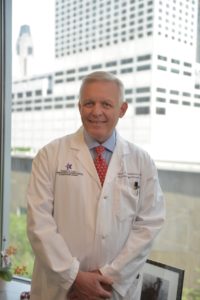
A drug called bevacizumab added to adjuvant chemotherapy did not improve outcomes for patients with a form of high-risk breast cancer, according to results of a clinical trial published in the Journal of Clinical Oncology.
William Gradishar, MD, chief of Hematology and Oncology in the Department of Medicine and deputy director of the clinical network of the Robert H. Lurie Comprehensive Cancer Center of Northwestern University, was a co-author of the study.
Bevacizumab is a drug that inhibits the growth of new blood vessels, which is known to play a key role in breast cancer progression.
In prior clinical trials, bevacizumab had been shown to improve progression-free survival — although not overall survival — when combined with chemotherapy in patients with metastatic breast cancer classified as HER2-negative. (HER2-negative indicates that tumors lack overexpression of the human epidermal growth factor receptor 2, a protein that promotes the growth of cancer cells; such a cancer would therefore not respond to drugs that target HER2.)
In the current study, the investigators hypothesized that bevacizumab would be most clinically effective when used in the adjuvant setting, when patients with breast cancer who have undergone surgery receive additional therapy to reduce the risk of recurrence.
The phase III trial included 4,994 patients with high-risk, HER2-negative breast cancer who were randomized to receive bevacizumab or a placebo while also undergoing adjuvant chemotherapy regimens.
The investigators found that bevacizumab added to adjuvant chemotherapy did not improve invasive disease-free survival or overall survival in the study population. There was also a high rate of early discontinuation with bevacizumab, which may indicate an unwillingness of patients and physicians to accept bevacizumab toxicities.
Bevacizumab blocks vascular endothelial growth factor (VEGF), a protein which helps cancers grow blood vessels. The authors note that other clinical trials that have similarly investigated targeting VEGF in the context of melanoma, colon cancer, lung cancer and HER2-positive breast cancer have also had negative findings.
“We have no choice but to conclude that the underlying hypothesis, namely that inhibiting VEGF would be most effective in the adjuvant setting, is simply wrong,” the authors wrote.
Gradishar is also the Betsy Bramsen Professor of Breast Oncology and director of the Maggie Daley Center for Women’s Cancer Care.
Read more:
- Lurie Cancer Center Earns Exceptional Rating from National Cancer Institute
- Drug Regimen Boosts Outcomes for Some Breast Cancer Patients
- Scientists Examine Epigenetics of Breast Cancer
The study was supported by National Institutes of Health grants No. CA180820, CA180794, CA180790, CA180791, CA180795, CA180799, CA180802, CA180816, CA180821, CA180844, CA180847, CA189830, CA189859 and CA189863, the Breast Cancer Research Foundation and Susan G. Komen Foundation.






